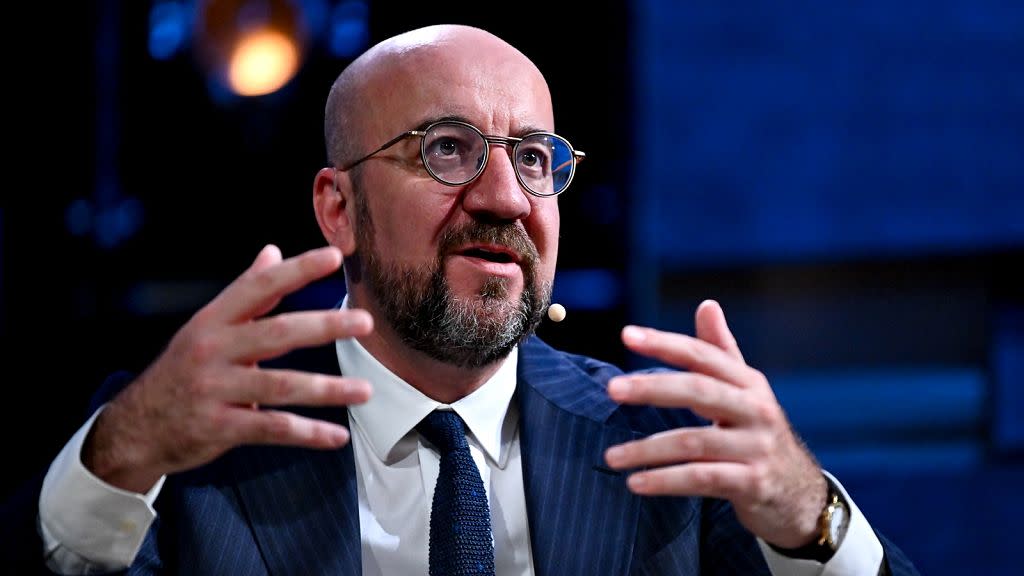Possible to cooperate with 'some' far-right personalities, says Michel

- Oops!Something went wrong.Please try again later.
- Oops!Something went wrong.Please try again later.
It is possible to cooperate with "some" far-right personalities, says European Council President Charles Michel.
Michel made the comment at the Copenhagen Democracy Summit on Tuesday when he was asked about the upcoming elections to the European Parliament, where hard- and far-right parties are projected to enjoy a significant boost in representation.
"The question in the European Parliament will be: What are the political parties ready to cooperate (with), to collaborate to support Ukraine, to defend the democratic principles and to make the EU stronger?" Michel said on stage.
"If I'm observing the reality of some of those political parties that you qualify as the 'far right,' the reality is sometimes a bit more balanced in some of those personalities within those parties – personalities with whom it is possible to cooperate because they can share the same goals, the same views on those topics," he went on.
"And with some others, in my opinion, it's not possible to cooperate."
Michel did not mention any party or personality by name, but his remarks seemed to refer to Italian Prime Minister Giorgia Meloni, whose three-party coalition has been described as the most right-wing in the country's history.
Due to its strident Eurosceptic tone, Meloni's campaign for Italy's leadership had sent alarms ringing in Brussels. However, upon coming into office, the premier baffled critics by adopting a more pragmatic approach to EU politics, proving constructive on key issues such as support for Ukraine and migration reform, while remaining opposed to the Green Deal.
Meloni and her allies from the European Conservatives and Reformists (ECR) group, including Poland's Law and Justice (PiS) and Spain's Vox, are seeking to secure a sizeable share of seats in the next Parliament and further tilt the agenda to the right.
The shift has raised questions over how much the traditional mainstream parties are willing to accommodate, or even align with, the demands from the extreme right. In recent years, the centre-right European People's Party (EPP) has struck working arrangements with ECR forces in Italy, the Czech Republic, Sweden and Finland.
Last week, Croatian Prime Minister Andrej Plenković, a prominent EPP politician, signed a new deal with the ultra-nationalist Homeland Movement, a party that intends to join the far-right Identify and Democracy (ID) group in the European Parliament.
Plenković's move revived concerns about the normalisation of the far right, a phenomenon that progressives say threatens European democracy and integration.
Focus on the substance
For Michel, though, what matters is the results.
"What is important, in my opinion, is the policy, is the substance, and what are the decisions we are making," Michel said in Copenhagen.
"I don't want to give one concrete example, but I remember that sometimes in the (European) Council when there were elections in one member state, there were some doubts and some worries," he added, in another apparent reference to Meloni.
"And then we have seen that it was possible to work with the leadership of countries, including when in one coalition you have some political parties more oriented to the right."
Michel's comments put him at odds with his own liberal family, Renew Europe, which is firmly opposed to cooperation with either ECR or ID.
Last week, Renew Europe joined the socialists and the greens in a statement condemning growing violence against lawmakers, activists and journalists, which they linked to the rise in support for far-right parties.
"For our political families, there is no ambiguity: We will never cooperate nor form a coalition with the far right and radical parties at any level," the statement said.
Michel, who will leave office later this year after completing his mandate at the top of the European Council, said he was "confident" that centrist parties would continue to play an "essential role" in the EU's future.
"I know that this is usual a few weeks before the elections, that we are worried and that we think that the worse will come," he said.
"I am a bit more calm. I am a bit more serene."

